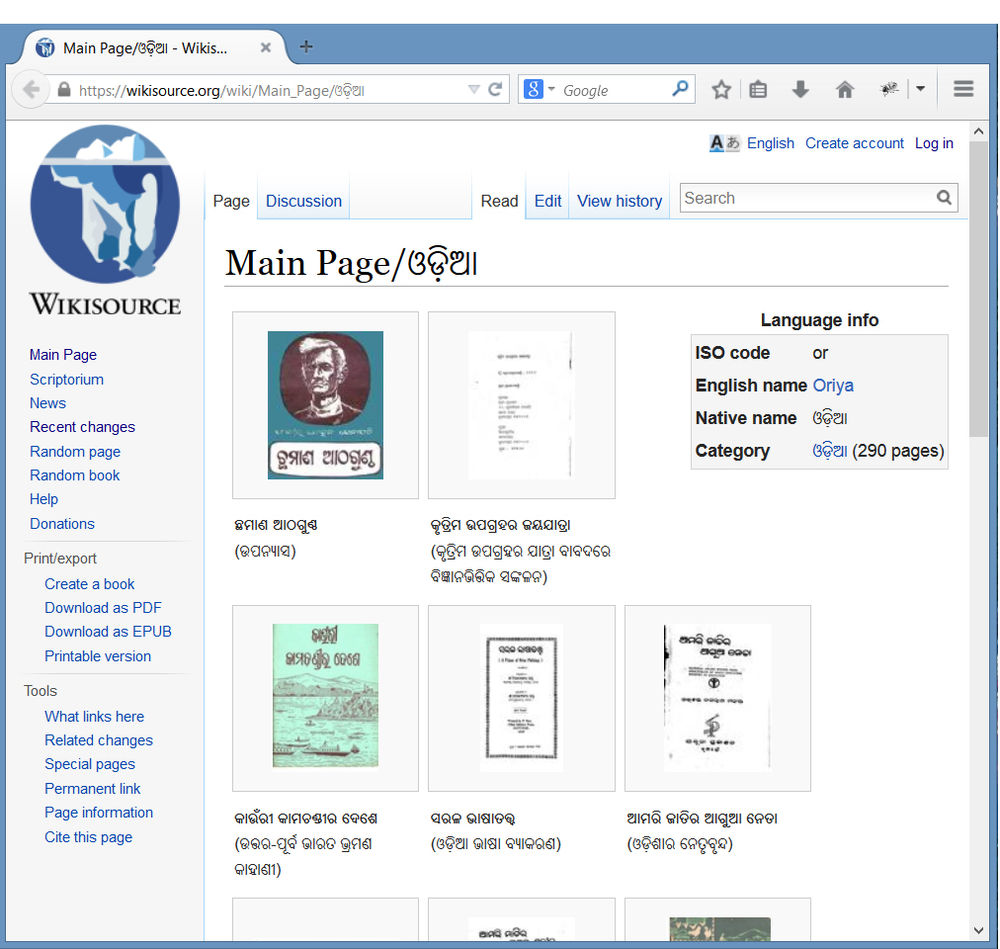This blog post was first published at Rising Voices on October 18.

(“Odia Wikisource incubator project screenshot” by Wikimedia Foundation. Licensed under CC BY-SA 3.0, except the Wikisource logo which is (c) Wikimedia Foundation)
Speakers of Odia will soon have mountains of books to read online in their mother tongue, following the launch of the Odia Wikisource, which will make accessible many rare books that have entered the public domain. Authors and publishers are also invited to donate their copyrighted work, possibly bringing open access to large volumes of books and manuscripts, creating a vast archive of educational resources. And everything will be in Odia.
One of the biggest advantages of Wikisource is that all its books are available in Unicode, meaning that Google's search engine indexes the texts’ entirety, and readers are able to copy easily what they wish. (Most conventional archival systems lack this feature.) A volunteer community administers Wikisource. To upload a book's content, volunteers either retype the books word-for-word, or, when possible, use Optical Character Recognition (commonly known as “OCR“), which converts scanned images into editable text. Available at or.wikisource.org, Odia is Wikisource's eleventh Indic language.
There are more than 40 million native Odia speakers in the world. Most live in the Indian state of Odisha and its neighboring states, but there is a large diaspora in countries like the US, UK, UAE, and across South and East Asia. Despite being spoken by so many people, Odia's online presence is relatively small.
As of October 2014, Odia Wikipedia hosted 8,441 articles. The state government's websites have Odia-language content, naturally, but none of the text is in Unicode, making the materials invisible to search engines and difficult to share. Thanks to individual and organizational efforts, some Odia-language websites have recently emerged with Unicode content.
With support from the non-profit organization Pragati Utkal Sangha and the National Institute of Technology Rourkela, a Bhubaneswar-based outfit has digitized about 740 books through the Open Access to Oriya Books (OAOB) project. Most of these texts were published between 1850 and 1950. The OAOB project is the largest existing digital archive of Odia literature, but the archived books are only available as scanned PDFs, restricting readers’ ability to search within the texts.
As a Wikimedia project, Odia Wikisource underwent a long approval process, after running as an active incubator project for nearly two years. Both the Language Committee and the Wikimedia Foundation's Board reviewed and endorsed the project.
Odia Wikisource has already digitized and proofread three books entirely. In collaboration with the Wikimedia-funded Centre for Internet and Society‘s Access to Knowledge, the Kalinga Institute of Social Sciences (KISS) has partially digitized another book, as well. KISS is also busy digitizing another Nine books by Odia-language author Dr. Jagannath Mohanty that were relicensed to CC-BY-SA 3.0 earlier this year.
In response to posts on Twitter and Facebook, four new contributors recently joined Wikisource to help digitize “The Odia Bhagabata,” a literary classic compiled in the 14th century. “Content that have already been typed with fonts of non-Unicode encoding systems could be converted by converters which was the case of Odia Bhagabata. New contributors did not face the problem of retyping the text, as the book was already available on a website Odia.org and is out of copyright”, says Manoj Sahukar, who (along with yours truly) designed a converter that helped to transcribe “Bhagabata”.
Rising Voices contacted some of those whose efforts made this happen.
| “ |
Mrutyunjaya Kar (MK), Long time Wikimedian who has proof-read the books on Odia Wikisource |
” |
| “ |
Nihar Kumar Dalai (NKD), Wikisource writer |
” |
| “ |
Nasim Ali (NA), Oldest active Odia Wikimedian and Wikisource writer |
” |
| “ |
Pankajmala Sarangi (PS), Wikisource writer |
” |
| “ |
Amir Aharoni (AA), Wikimedia Language Committee member and Software Engineer at the Language Engineering team at the Wikimedia Foundation |
” |
Clearly, strong passions motivate Odia Wikisource's volunteers, like Nihar Kumar Dalai, who writes on Facebook:
| “ |
Hindi and English are fine, but our native language is bit more special! Who of us does not now about the art, culture, noted personalities, tourist spots and festivals of Odisha? But if you search online about all of these then there is very little available. There comes a simple and easy solution – Odia Wikipedia. Like Odia Wikipedia, Odia Wikisource is another great place and this is my small contribution to bring Odia Bhagabata on Odia Wikisource. |
” |
Subhashish Panigrahi is a volunteer contributor for Wikipedia and in past worked as a community and program support consultant for the Wikimedia Foundation.

Can you help us translate this article?
In order for this article to reach as many people as possible we would like your help. Can you translate this article to get the message out?
Start translation